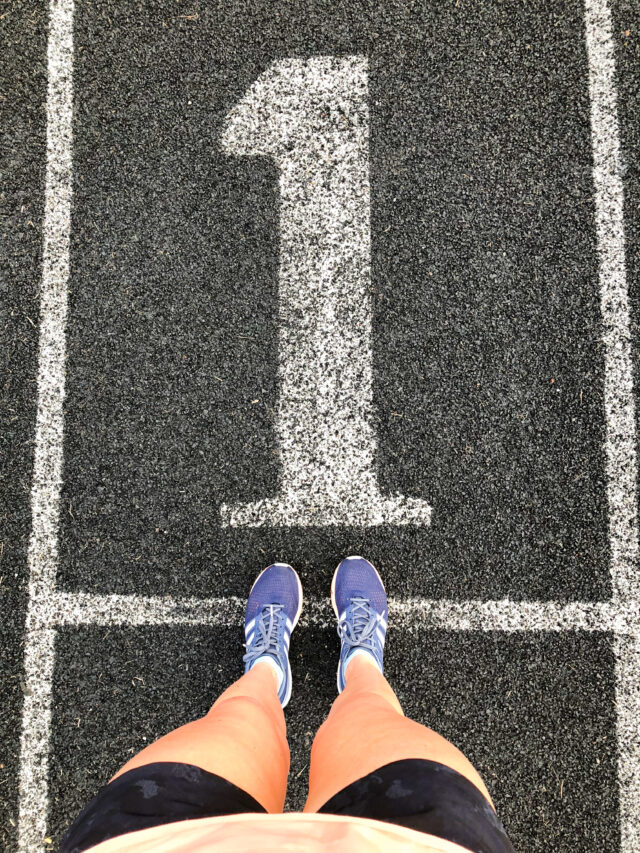


Does running impact fertility? Do certain types of workouts impact your cycle more than others? I asked a fertility specialist all my questions and shared his answers with you in this post.
As women, we are no strangers to menstrual cycles, reproductive systems and all that goes with it. Yet, so many women who exercise have questions about fertility treatments and what physical activity — particularly running — is okay before conceiving and during pregnancy. I asked those tough questions and got some truthful, real answers straight from a doctor who specializes in obstetrics and gynecology. Today I’m sharing what I learned about how exercise and running affects (or doesn’t affect) fertility levels in women.


We LOVE our Thule Jogging stroller.
A few years ago, before I got pregnant, I spoke with Dr. Jeff Williams, an OB-GYN with Novant Health to ask him about working out and how running can affect fertility. At some point, I may blog about our journey to conceive since it wasn’t without challenges, and we received some unexpected news before we even tried to get pregnant. (Fast forward to now, and we have our son, Thomas!).
While I didn’t talk to Dr. Williams about our particular situation, I did have a lot of questions about fertility and running long before I got pregnant (especially since I was in my mid-30s before we tried to conceive). And I know a lot of other female runners have similar questions.
So, when I was partnering with Novant Health a few years ago, I talked to them about doing a post on this topic since I felt so passionate about getting accurate information out there from someone with real credentials. And now, a few years later after that conversation with Dr. Williams, I’m re-sharing this post since I’m just so, so grateful for our babe. I truly hope this helps you advocate for yourself and better understand what does and doesn’t impact your fertility as it relates to running.
There is a LOT of information in this post and it can be pretty dense to digest it all. So take some time to read it and then speak to your doctor about your specific situation and your goals to start a family.
Dr. Williams explained that “The intensity and duration of aerobic exercise is probably more important than the specific type of exercise. For example, running, cycling or gymnastics in particular have not been proven to impact fertility. But doing any one of these with high intensity could have an impact on fertility in specific situations. No one exercise is worse than the other in affecting a woman’s ability to conceive. In general, it’s safe to say that moderate exercise before, during and after conception has many health benefits.”
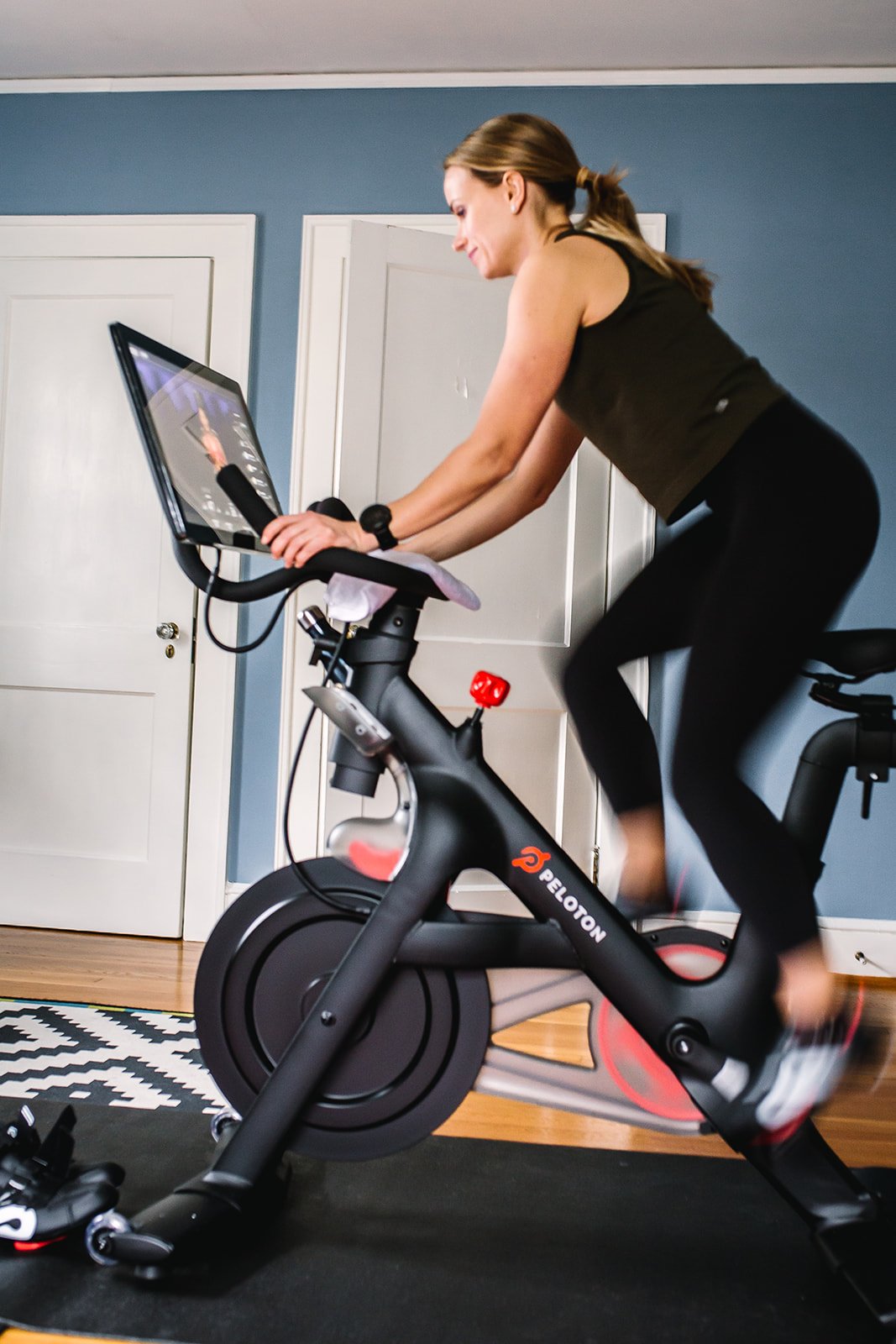
The American College of Obstetricians and Gynecologists states that “Physical activity in pregnancy has minimal risks and has been shown to benefit most women, although some modification to exercise routines may be necessary because of normal anatomic and physiologic changes and fetal requirements.” If you are pregnant, be sure to read about the benefits of running while pregnant. And you can also read about my pregnancy running journey too.
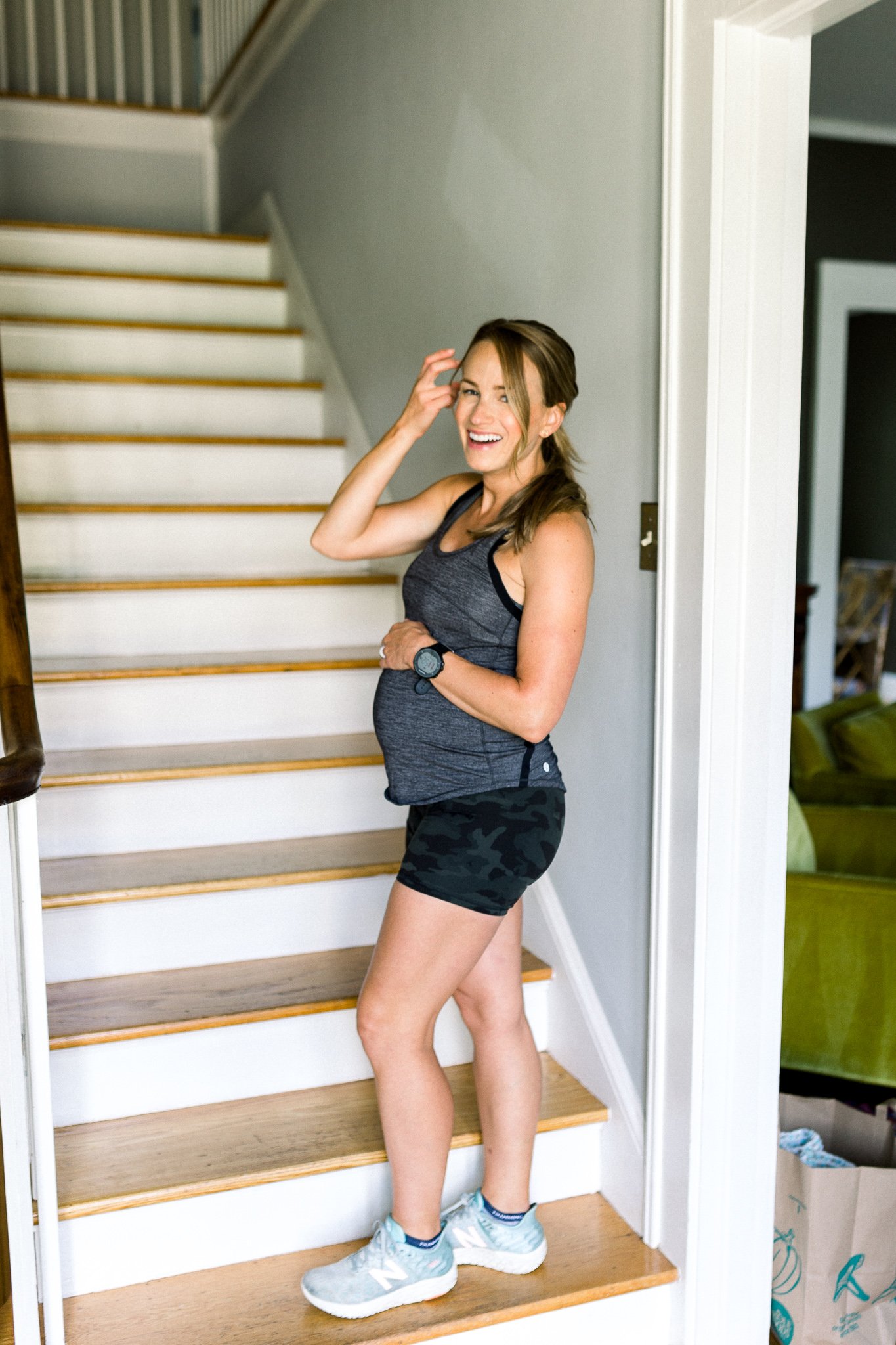
Dr. Williams: “Regarding exercise before, during and after ovulation, specific exercises likely won’t be more or less detrimental depending on when they’re done or avoided during the cycle in a woman of normal fertility. If you are somebody who has a healthy weight, a Body Mass Index (BMI) of 18.5 to 25, and you are used to running a specific amount, you could continue to run and do what you normally do.”
But, if you don’t exercise intensely or consistently and you want to exercise to stay healthy (and you have a normal BMI), Dr. Williams said that aiming for about 150 minutes of moderate moderate intensity per week would be healthy for most patients. (Moderate intensity is something like brisk walking to keep your heart rate up) Keeping your exercise habits similar is what you are aiming for.
If, however, you are having difficulty conceiving, you need to speak with your physician who may recommend you reduce your exercise intensity or duration even if you have a normal BMI as there are certain factors that contribute to the ability to get pregnant. You want to be aware of anything negatively impacting the ability to conceive. As always, speak to your doctor about exercise and fertility for your specific situation.
It’s accepted throughout the medical field that a healthy body weight is a BMI of between 18.5 and 25. BMIs greater than 27 and less than 17 are associated with increased ovulatory problems and can affect a woman’s fertility. (Source)
One study showed that women with low or underweight BMI of less than 18.5 have a 25% increase in the time needed to achieve conception. “If women lose too much weight as a result of their workouts, it can be detrimental to fertility,” Dr. Williams shared. He also mentioned that some studies show that “high-intensity workouts may be associated with a reduction in fertility in women who already have a normal BMI of less than 25.”
Studies suggest that this happens because of the intensity levels of the workout rather than any specific exercise itself. In contrast, women who practice high impact, high-intensity workouts and have BMIs higher than 25 are less likely to have infertility as a result of their exercise alone.
Another study compared women with a mean BMI of 19.2. They found that if those women gained around eight pounds, this weight gain would contribute to fertility. Remember that BMI doesn’t take into account your body fat. So it’s important to have healthy body fat levels and stay at a healthy weight for your height. Those will both have a beneficial effect on fertility.
Having open conversations with your doctor about your weight (including weight loss or weight gain), body fat, BMI, activity level and family goals is critical since there are so many factors that a simple calculator from the internet won’t give a full picture of your specific situation.
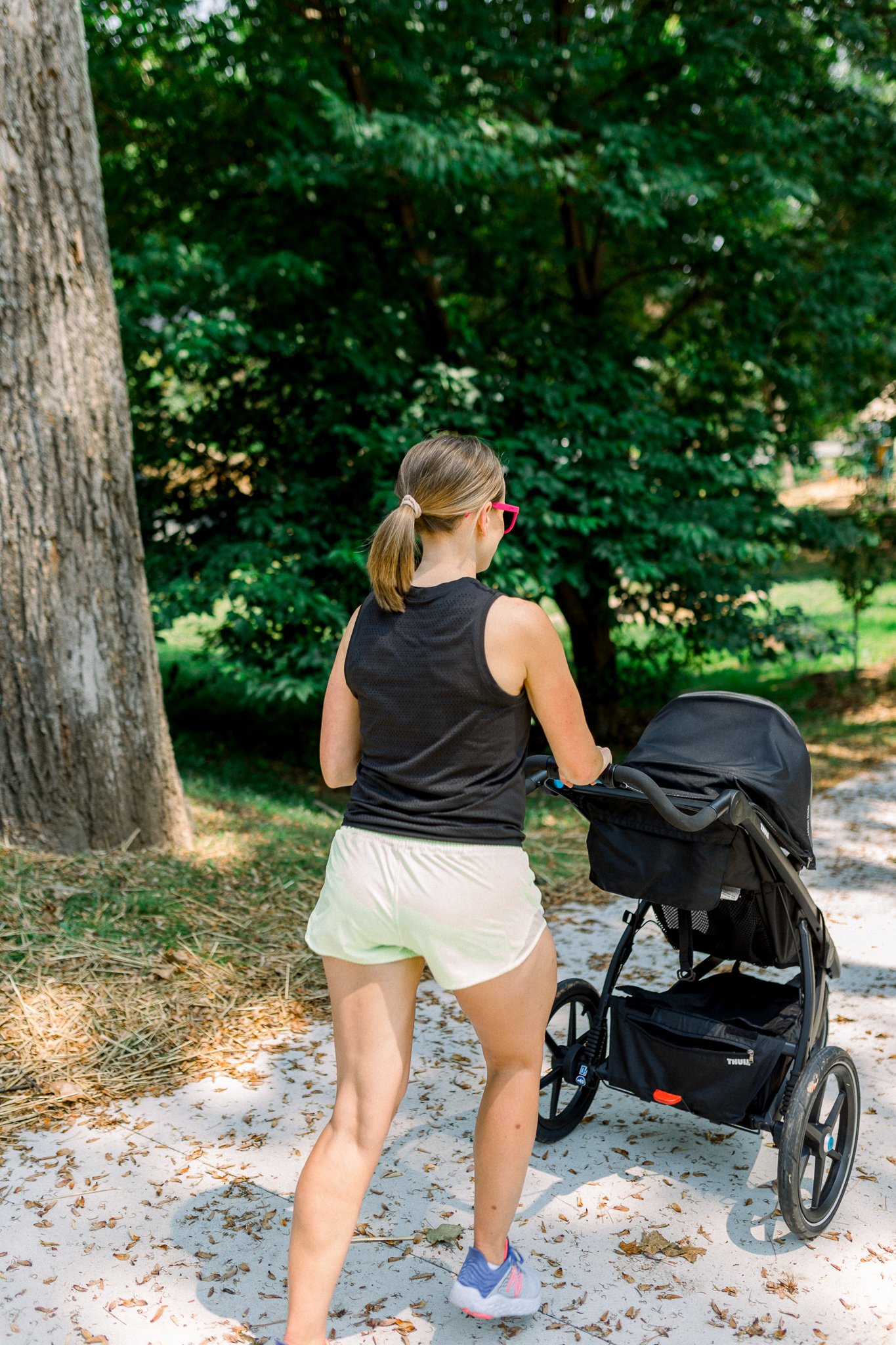
See? We LOVE this jogging stroller.
Dr. Williams: “In many cases, there are not always obvious signs or symptoms that indicate running impacts fertility. Sometimes the first sign is an abnormality in a woman’s cycle. This includes longer cycles or the disappearance of a cycle entirely. It’s important to have an annual exam with your OBGYN. Bring up this question so he or she can address your specific situation since there are so many variables.”
Dr. Williams shared that if you are a woman with a BMI within the normal range of 18.5-25 and you are already a consistent runner, you likely could continue to run as normal and it won’t impact your fertility. But, if you are having difficulty conceiving and you are already of a normal BMI, your doctor may ask you to reduce the intensity of your exercises; furthermore, starting a high-intensity exercise program may not be a good exercise plan for you to move forward with. If you’re in the middle of marathon training, that’s a great example of something you’d want to discuss with your doctor.
If you are not used to vigorous running or high-intensity exercise, opt for 150 minutes per week of moderate-intensity workouts after speaking with your doctor. This would be equivalent to brisk walking or yoga; both are shown to be healthy for patients.

Dr. Williams: “Some patients choose to use birth control because they have fewer bleeding days. This in turn, makes exercise or running more convenient for some women. The benefits of exercise, in general, have been shown to help reduce painful menstrual cramps in some women. It won’t necessarily make you faster or slower.”
Unfortunately, contraceptives containing hormones (including pills, implants, IUDs) can affect a woman’s menstrual cycle leading to the inability to use cycles as an effective energy marker. This is why annual screenings are so important, especially for active women or those who consistently do intense workouts.
Dr. Williams suggested talking to your OB-GYN about your specific type of birth control and activity level since you may not have an easy-to-track cycle. And keeping track of your cycle’s regularity is one of the keys to knowing if there are any issues.
While there are several hormonal imbalance tests you can buy online, Dr. Williams recommends against using them. Why? “Female hormonal fluctuations are normal throughout a woman’s menstrual cycle and specific hormones are targeted at different times throughout your cycle. If you are not collecting these hormone tests at the right time in your cycle, it is very difficult and often impossible to interpret what your results mean. That is why hormonal evaluations should be ordered — and interpreted — by a licensed physician.”
If you do want to test at home, this post about the best fertility tests and monitors is helpful.
Highly active women are at risk of having what’s called the “Female Athlete Triad”. Or at the very least, symptoms of it. Every OBGYN should be looking for this with active patients. Dr. Williams reminded me that “As a patient, it’s imperative that you share specific details with your doctor about your activity levels, energy levels and caloric intake.”
Dr Williams stated that, “Typically, for most cases, the menstrual cycle is the first to go, or disappear. When this happens, patients should seek out expert advice through their OB-GYN. Now, missing a period in and of itself is not really the problem. OB-GYNs are concerned with why you are losing your period. This can vary from patient to patient.” The luteal phase is a stage in the menstrual cycle right after ovulation and before your period starts. This stage is essential in conception, and you want this stage to be happening properly.
“Having and keeping track of your normal menstrual cycle can be used as a marker of appropriate energy levels within your body. Once a woman’s energy balance is restored and energy is no longer being pulled from the reproductive system, it is likely that a regular period cycle will commence – but this will vary from woman to woman.”
If you are an intense exerciser and you skip your period when you typically have a regular cycle (and you’re not pregnant!), “After first speaking with your doctor, sometimes a good first step is to back off your training and/or increase your nutrition to see if it comes back. But again, in general, it’s always good to make an appointment with your OBGYN if you miss your period.”
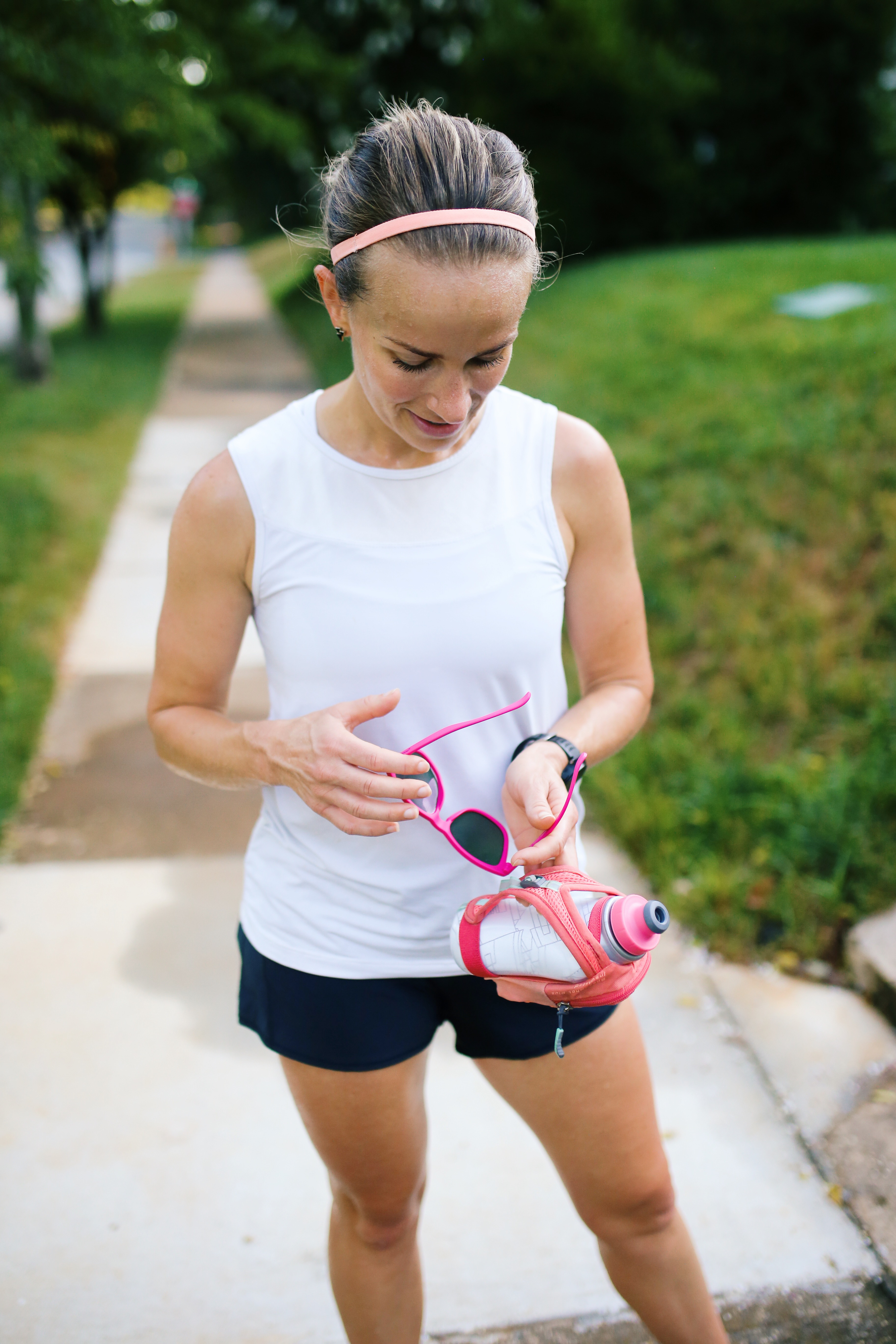
However, if an OBGYN suspects a patient has the triad, they should ask appropriate questions to confirm their suspicions. If confirmed, you essentially don’t have a healthy energy balance, either through insufficient caloric intake or through excessive, intense exercise.
Dr. Williams explained, “Insufficient calories or excessive exercise causes a woman’s body to have low energy levels. In response to low energy levels, the body starts to pull nutrients from the bone which leads to low bone density. Low bone density is known to cause fractures in the short term, and can even affect bone health into the future. Your doctor may want to do a bone density scan, depending on what symptoms you’re presenting and how severe they are.”
Dr. Williams emphasized that if you are concerned that you suffer from an eating disorder, know that you excessively restrict your food intake, or have suffered from a stress fracture, talk to your doctor sooner rather than later. “These behaviors might be strong indications that you have an energy imbalance in your body which can affect your ability to conceive. Other problems that can occur in the female athlete triad include painful intercourse, elevated cholesterol, and cardiac health issues.”
Dr. Williams said that, “It’s often not a problem until it becomes a problem”. He agreed that there are many women who run 100+ miles a week and don’t have issues. For many women, they can just continue what they’re doing and conceive easily. “But, if you’ve been trying to conceive for 12 months and everything else in your evaluations is normal (thyroid, prolactin, hormones, tubes are good, male’s sperm is fine, etc.), then we may need to consider that it’s something else. You may need to increase your caloric intake to give the body more energy to support the reproductive system. Take some stress off the body.”
Finding a doctor who helps you feel supported in your exercise goals is key. Find one who is supportive of your running and will help you explore other explanations for fertility issues rather than immediately shutting down your workouts.
And remember, it’s important to share just how much you’re exercising. For example, I’ve always told my OBGYN that I run 5-6 days a week but I didn’t share that I run 40-60 miles a week. (I will going forward!) That level of mileage is very high compared to the general population. So, it’s important to call out circumstances that make your health situation unique.
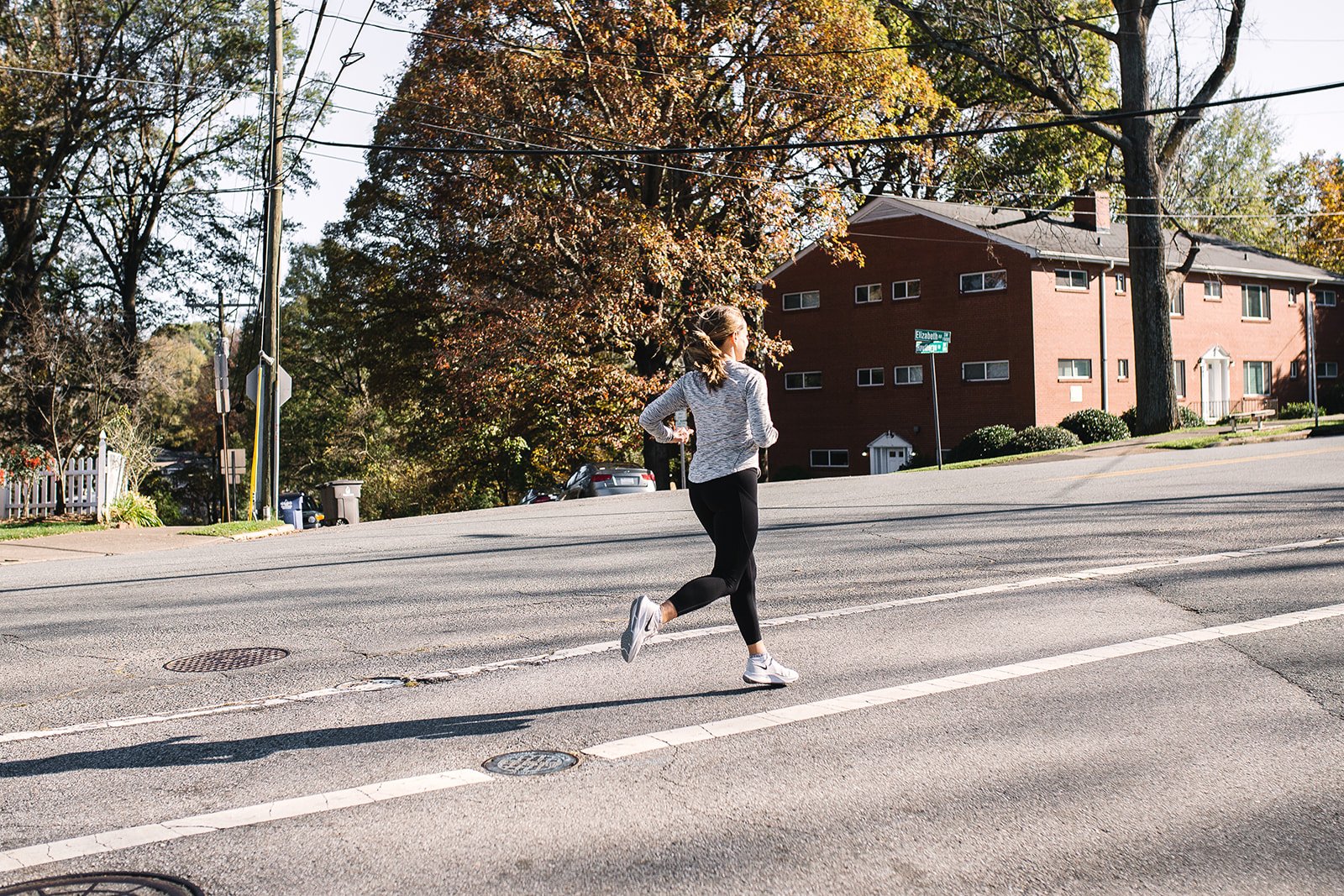

A diet high in antioxidants could be beneficial to help preserve fertility or help when you’re trying to conceive. But, Dr. Williams shared that there isn’t any known data that supports a specific diet. But a balanced diet that’s high in antioxidants may be beneficial for fertility.
As far as specific supplements for women who are trying to conceive, you should speak to your physician.
“One in particular that I use often for women with polycystic ovarian syndrome is something called Myoinositol. Myoinositol is a supplement that’s been shown to potentially improve ovulatory events and improve egg quality. Interestingly, an embryologist can actually look at an egg in a women that has had supplementation with Myoinositol and they will see beneficial anatomical improvements in the egg. So we think it improves egg quality and benefits the ovulation event,” Dr. Williams said.
But, don’t just go buy that on the internet without speaking to your doctor. “It’s always best to speak with your physician before making any major changes and taking supplements.”
This fertility smoothie is tasty if you want to add it to your diet. It can’t hurt!
The biggest thing I took away my conversation with Dr. Williams was each and every person and fertility situation is different with so many variables and I really need to speak up with my specific questions. Don’t only rely on your doctor to bring up a specific issue since they see so many patients with so many issues. And again, if you don’t give your doctor all the information in specific detail (e.g. activity level, nutrition concerns, etc.). They may not know to explore something further.
It’s so incredibly important to talk to your doctor and discuss your health to find the root issue if you are struggling with fertility. And even if you aren’t struggling with fertility but want to make sure you’re taking care of your health to prevent issues down the road, Dr. Williams suggested going into every doctor appointment (including your OBGYN). Include goals or a list of questions that you’d like to discuss.
Dr. Williams shared, “It’s helpful if a patient comes in saying, ‘This is my chief complaint or this is what I want to talk about today.’ Go into your appointment with your specific concerns and that will help your doctor get to any root issues.”


I hope this post helps you with your running goals and health, both short-term and long-term. I know I found the conversation incredibly valuable. A big thank you to Dr. Williams and the Novant Health team who spent so much time to help address this important topic on the effects of running on fertility. A little bit about Dr. Williams: he’s originally from Knoxville, TN and completed his residency in Missouri and his fellowship in Nebraska. He moved to Winston-Salem, North Carolina in 2019.
Happy, healthy running!
Note: This post was originally sponsored by Novant Health in 2019. I’m republishing with some updates and without a sponsorship because I think it’s such an important topic.
You might also like this post about Fertility Goddesses from one of my favorite fertility bloggers.


Leave a Comment
15 responses to “Effects of Running on Fertility: what an OBGYN told me before we got pregnant”
Hi there! I’m new to your blog and just have to say this is one of the most helpful posts I’ve read in a very long time on any blog! It answered a ton of my own questions. Thanks for tackling this topic.
Thanks for writing about this! I had SO many questions when we were struggling with infertility, and there unfortunately aren’t a lot of good resources out there. (Which I totally get — women get asked enough inappropriate questions about family planning without bringing up the topic on their own.) I feel really thankful to have been able to run through two healthy pregnancies (well 30 weeks into the second one) even after my fertility specialist had me decrease my mileage significantly during treatments to get pregnant with our first. It is something that has really made me grateful for my body and what it is capable of, and something I think I previously took for granted.
Anyways, thank you!
This is very thorough and I think many people will find it helpful and interesting! I particularly like that you don’t shy away from topics people might find “icky.”
Thanks for writing!! Such an important topic. I lost my cycle from working out 6 days a week (running, spinning, yoga, & HIIT classes) at a very healthy BMI. Luckily, I went off the pill long before I wanted to conceive and my doctor told me to tone it down and eat extra carbs and fat and it came back quickly. Every body is so different and my biggest piece of advice to women would be to go off birth control well in advance to give yourself time to figure it all out!!
Thank you for writing this. There is so much nonsense on the internet that is based on absolutely zero scientific data. People need to see stuff like this that is factual!
I love this post! I was told exercising didn’t affect fertility and pregnancy until we struggled with infertility and sustaining a pregnancy and then I was told to stop exercising. Such an important topic that needs more discussion!
Great article-well researched, thorough and interesting. I’ll echo what everyone else already said, when I went through infertility treatments (i.e. IUI, IVF) many years ago, I was told to give up running entirely. Running did not by itself did not cause my infertility (endometriosis took care of that!). I think the thought was, ” you cannot be too cautious.” Unfortunately, fertility treatments are stressful enough. Removing running and coffee from my life at that time was rough.
Hi! I have endometriosis and I used to be an avid runner and my accupucturist and friend told me to stop. So, i stopped completely. Do you think 5k a week is okay? i did 5 iuis and no luck yet. I have not run since “August and supposed to try IVF in January, what do you think?
Definitely talk to your doctor! They can provide the best guidance for your situation.
This is a great post!!! I agree with everything your doctor said EXCEPT the bit about how there is no proven diet for fertility. We have lots of research, starting with the Harvard Nurses Study and going through the last couple years with research on macro, etc., , that are getting to the heart of the best fertility diet on average.
Funny you’d bring that up – in the past few days, I’ve been reading a LOT (and listening to podcasts from other fertility doctors) about the benefits of a plant-based diet and a low-sugar for fertility. I think that is a FASCINATING area that needs to be studied more! They referenced the Harvard Nurses Study!
Thank you for writing this article. Lots of great information. I was a runner (that is how I found your blog way back in the day). As a runner who produced two children, I found a lot of the points to be spot on. It took me more than a year to conceive my first child and it only happened when i cut back on marathon training and gained 6 lbs to be around 130. It seemed that it was the spot when my body was able to have more optimal fertility. I am glad that you were brave to tackle this topic. It is not easy to talk about this. I love reading your blog 🙂
awesome post!! from someone who is dealing with fertility struggles, thank you for sharing.??
Good post. I went through fertility treatments (long ago). One of my first questions to my doc was if I could run during treatements. I was told absolutely NOT. I could however, do lower impact exercise such as walking, and using the elipitical. I sure did miss running-it would have been very helplful to run to reduce the crazy stress I was under during treatments.
It sounds crazy, but when we are extremely stressed, our bodies actually have a way of stopping us from getting pregnant. The adrenaline that is secreted during times of extreme stress actually inhibits the body from using progesterone, which is the hormone responsible for ovulation and fertility.
Adrenaline also causes the pituitary gland to increase prolactin levels, which can cause infertility. Stress can inhibit the body’s most important sex hormones, decrease sex drive, suppress ovulation, and lower sperm counts.
There is even a name for infertility caused by nothing but stress related issues. It is called Stress Induced Reproductive Dysfunction and it really does affect many women.
It is very clear to see that stress very largely has an effect on fertility. The body knows that carrying a baby to term can be very difficult when a woman is under a lot of stress, so this is it’s way of protecting her from that.